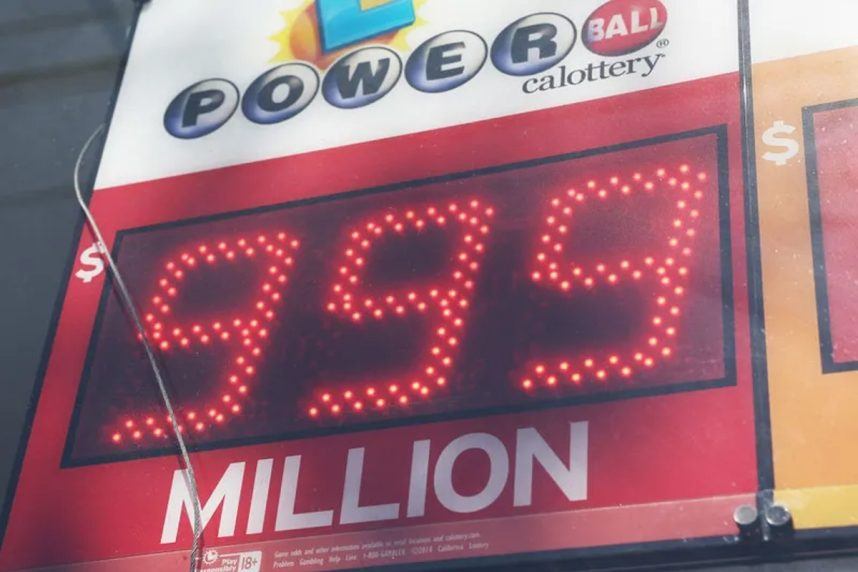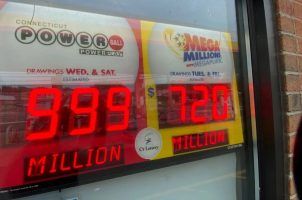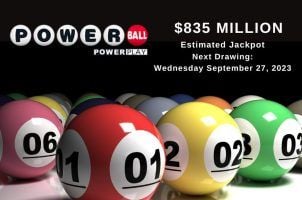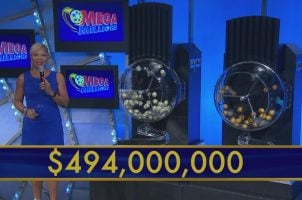Powerball Moves Past $1B Mark, as Jackpot Skirts Players for 32nd Straight Drawing
Posted on: October 1, 2023, 04:39h.
Last updated on: October 2, 2023, 06:49h.
The Powerball drawing for Monday night will be just the fourth time in the lottery game’s history that the top prize is worth more than 10 digits.

Powerball on Saturday night evaded players again, as no ticket matched the drawn numbers of 19, 30, 37, 44, 46, and the red Powerball 22.
There were seven tickets that matched all five white balls, but not the red one, and 55 tickets that matched the Powerball and four of the five white balls. But for the 32nd consecutive drawing, no play matched all six.
The Powerball jackpot hasn’t been won since July 19, when a player in California snagged the top prize worth $1.08 billion. The ticket was sold in Los Angeles near Skid Row, a neighborhood notorious for homelessness and crime.
With the jackpot rolling over for a 33rd time, Powerball officials project the annuitized prize paid out over 30 disbursements to be approximately $1.04 billion. The one-time cash value is an estimated $478.2 million.
History in the Making
Monday night’s Powerball drawing will be just the ninth time in U.S. history that a lottery prize is worth more than $1 billion.
The richest lottery jackpot ever was won last November, when a player in California named Edwin Castro won a $2.04 billion annuity. Castro opted for the one-time cash option, which, after federal taxes, came to about $628.5 million. Castro’s win marked the only time that a U.S. lottery jackpot ever climbed upwards of $2 billion.
The odds of a ticket winning the Powerball jackpot are just one in 292.2 million. The game is drawn three times a week at 10:59 p.m. ET on Monday, Wednesday, and Saturday. Players must select five white balls from a pool of numbers ranging from 1 through 69, plus a red Powerball from a pool numbered 1 through 26.
Each Powerball gameplay’s odds remain constant at one in 292.2 million. But the odds of the jackpot hitting presumably shorten as the prize grows, as more ticket sales equate to more possible number combinations being covered by players.
While playing the lottery provides players with a bit of hope, financial advisors caution the public from betting with the anticipation of winning. Mathematicians say it’s like flipping a coin 28 times in a row and landing on heads each time (try it, it’s not going to happen. Don’t have a coin? Davidson College in North Carolina has an online tool.)
Tim Chartier, a mathematics and computer science professor at Davidson, says you’re 300 times likelier to be hit by lightning at some point in your life than winning the Powerball jackpot. In another example of why you won’t win the jackpot come Monday night, Chartier says the odds are “akin to me looking back at the past nine years, picking one second, and then asking you to guess which second I chose.”
“The odds that you’ll get it right are incredibly long,” he said.
Annuity Becoming More Attractive
The Powerball and Mega Millions jackpots are based on a 30-year annuity, with bonds backed by the U.S. Treasury. With the federal interest rate north of 5%, the jackpots have escalated in value faster than they would if rates were lower, as they were in early 2022.
The Federal Reserve greatly increased its interest benchmark since March 2022 in an effort to curb soaring inflation. The Feds’ interest rate has gone from just 0.25% in March 2022 to 5.33% this week.
The full value of the advertised Powerball jackpot is paid out over 30 payments, with an immediate disbursement followed by 29 annual payments that will increase by 5% each year.
After the federal tax of 37%, the first payment would be about $21.87 million. The one-time cash option would be a net $301.3 million. Both amounts could be further subject to state income taxes.
Related News Articles
Powerball Dodges Players Again, Jackpot Swells to $835M
$1.35B Mega Millions Winner Comes Forward in Maine, Picks One-Time Cash Option
Most Popular
Mirage Las Vegas Demolition to Start Next Week, Atrium a Goner
Where All the Mirage Relics Will Go
Most Commented
-
Bally’s Facing Five Months of Daily Demolition for Chicago Casino
— June 18, 2024 — 12 Comments
















No comments yet